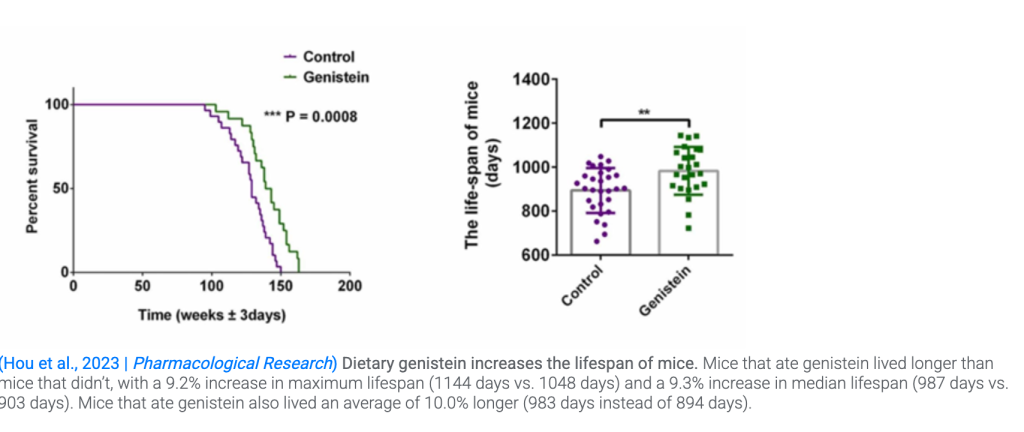Key Findings
A 2023 study from China Agricultural University demonstrated that dietary genistein supplementation significantly extends both healthspan and lifespan in mice through gut microbiome modifications.
Longevity Benefits
- 9.2% increase in maximum lifespan (1,144 vs 1,048 days)
- 10.0% increase in mean lifespan (983 vs 894 days)
- 9.3% increase in median lifespan (987 vs 903 days)
- Reduced frailty scores using 31 clinically relevant aging characteristics
- Delayed morbidity and improved aging phenotypes (coat quality, fur color, tail stiffness)
Mechanism of Action
Gut Microbiome Changes:
- Increased abundance of beneficial Lachnospiraceae bacteria
- Enhanced short-chain fatty acid (SCFA) production
- Improved metabolic pathways for SCFA synthesis
- Reduced systemic inflammatory cytokines
- Fixed intestinal inflammation, leaky gut, and poor cell regeneration
Fecal Transplant Validation:
- Microbiota from genistein-fed mice extended lifespan in progeria (accelerated aging) mice
- Improved intestinal barrier function in recipient mice
- Increased SCFA production in transplant recipients
Study Design
- Dosage: 400 mg/kg genistein supplementation in food
- Starting age: 18 months (equivalent to mid-to-late 50s in humans)
- Duration: Lifelong supplementation
- Model: Healthy mice with comparison to progeria mice for mechanism validation
Genistein Sources and Background
Genistein is found in leguminous plants, particularly soybeans and coffee beans. Previous research showed it alleviates inflammation, modifies gut microbiota, and improves intestinal barrier function across various disease models.
Human Clinical Evidence
Limited but promising human studies include:
- 2022 trial suggesting genistein may delay dementia onset in early Alzheimer’s disease
- 24-month study showing improved bone mineral density in osteopenic postmenopausal women
Age-Related Gut Changes
Normal aging involves:
- Decreased microbiota diversity
- Reduced beneficial microorganisms
- Increased harmful bacteria (Bacteroides vs Firmicutes ratio)
- Loss of SCFA and secondary bile acid production genes
- Compromised immune, cardiovascular, and nervous system protection
TL;DR: Genistein supplementation (400 mg/kg) starting at middle age increased mouse lifespan by 10% and maximum lifespan by 9.2% through gut microbiome modifications that boosted beneficial bacteria, increased anti-inflammatory SCFA production, and improved intestinal barrier function. Fecal transplants from genistein-fed mice extended lifespan in progeria mice, confirming the gut microbiome as the primary mechanism.
